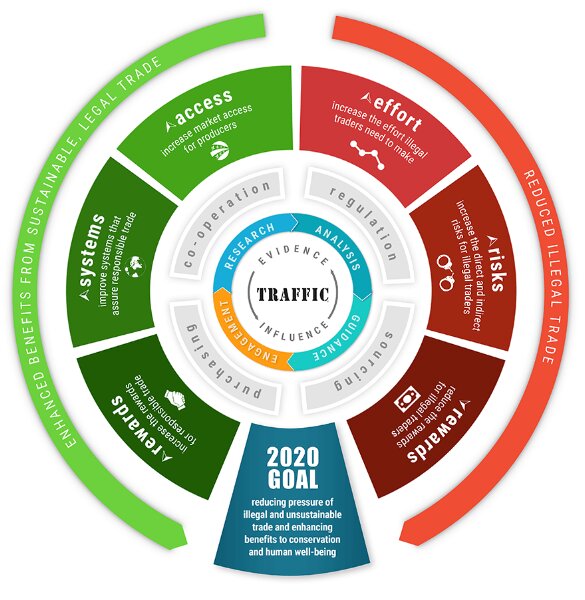Important Institution
TRAFFIC
- 20 Aug 2019
- 5 min read
Last Updated: July 2022
What is TRAFFIC?
- The TRAFFIC, the Wildlife Trade Monitoring Network, is a leading non-governmental organisation working on wildlife trade in the context of both biodiversity conservation and sustainable development.
- It is a joint program of World Wildlife Fund (WWF) and the International Union for Conservation of Nature (IUCN).
- It aims to ensure that trade in wild plants and animals is not a threat to the conservation of nature.
- It was established in 1976 and has developed into a global network, research-driven and action-oriented, committed to delivering innovative and practical conservation solutions.
- Headquarters: Cambridge, United Kingdom
- Illegal wildlife trade is one of the main reasons that many species are endangered.
How is it Governed?
- The TRAFFIC is governed by the TRAFFIC Committee, a steering group composed of members of TRAFFIC's partner organizations, WWF and IUCN.
- TRAFFIC also works in close co-operation with the Secretariat of the Convention on International Trade in Endangered Species of Wild Fauna and Flora (CITES).
- Its staff includes experts from a plethora of backgrounds: biologists, conservationists, academics, researchers, communicators or investigators, etc.
What are the Functions Performed by TRAFFIC?
- Since its establishment, it has helped in the evolution of the international wildlife trade treaties.
- It focuses on leveraging resources, expertise and awareness of the latest globally urgent species trade issues such as tiger parts, elephant ivory and rhino horn.
- Large scale commercial trade in commodities like timber and fisheries products are also addressed and linked to work on developing rapid results and policy improvements.
TRAFFIC and India: What is the Scenario?
- TRAFFIC operates as a Programme Division of WWF-India, based in New Delhi since 1991.
- It has since worked closely with the National and the State Governments and various agencies to help study, monitor and influence action to curb illegal wildlife trade.
- Bridging the gap in effective wildlife law enforcement in India through capacity building programmes:
- Under this programme, TRAFFIC provides training and inputs to a diverse group of officials working on wildlife enforcement and other related issues.
- Conducting research and providing analysis on wildlife trade and its trends:
- TRAFFIC India’s on-going projects include study on Leopard and Tiger poaching and trade in India, peacock feather trade, owl trade, dynamics of hunting community, trade in medicinal plants, bird trade and more.
- Awareness generation:
- “Don’t Buy Trouble” is one of TRAFFIC India’s first consumer awareness campaign that advises tourists to be careful of what they buy as souvenirs during their travels.
- The campaign has been running successfully since 2008 at airports, Tiger reserves, national parks, wildlife resorts/hotels, travel agencies, schools, colleges and other prominent locations.
- “Don’t Buy Trouble” is one of TRAFFIC India’s first consumer awareness campaign that advises tourists to be careful of what they buy as souvenirs during their travels.
- TRAFFIC’s latest campaign is the WANTED ALIVE series on the four Asian big cats- Tiger, Leopard, Snow Leopard and Clouded Leopard—all of them threatened by illegal trade in their body parts.
- Encouraging international collaborations to fight wildlife crime:
- TRAFFIC played a key role in bringing together the South Asian countries to form the South Asia Wildlife Enforcement Network (SAWEN).
- SAWEN was formally established at an inter-governmental meeting hosted in Paro (a town in Bhutan) by the Royal Government of Bhutan, in January 2011.
- The main aim of this initiative is to have the countries collaborate and cooperate to fight wildlife crime in the region.
- TRAFFIC played a key role in bringing together the South Asian countries to form the South Asia Wildlife Enforcement Network (SAWEN).
- These are some of the priority issues and areas of intervention identified by offices in the Asia Pacific Regional Network:
- Food/Water/Energy security for resource dependent and vulnerable communities.
- FPIC and social safeguards.
- Regional and global advocacy processes (CBD, Post-2015 agenda and SDGs).
- Equitable access to natural resources, environmental governance, sustainable and customary land use.
- Engagement with civil society and building larger constituencies in support of sustainable development.
- Social impact and well-being indicators, better social and economic measures.
- Social dimensions of Green Economies, building resilient rural economies.







